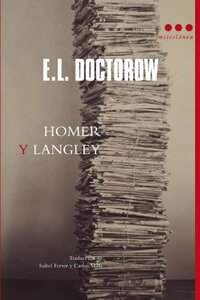Take a photo of a barcode or cover
Doctorow's attempt to get inside the minds of the Collyer brothers, whose hoarding case made headlines half a century before TLC started sifting through junky suburban homes, is extremely readable but not quite successful. In this fictionalized account, WWI vet Langley is obsessed with creating a "newspaper for all time," with platonic ideals of the stories that regularly cycle through front pages. He stashes the house with every paper he can get his hands on, not to mention "replacements" for other items: typewriters, pianos, even a Model T that takes up residence in the dining room. His blind brother Homer narrates--trusting, romantic, tragically passive.
The result at times is a kind of twisted Forrest Gump, in which the brothers barricade themselves from a harsh world only to have history bust through the doors in the form of Prohibition-era gangsters and Vietnam-era hippies. But whatever connections Doctorow is trying to make about the cycles of history don't quite take hold for me. Meanwhile, the impact of the hoarding is downplayed. If you Google pictures of the Collyer brothers' home, you will see that in such an environment, precarious walls of rat-infested STUFF would quickly become the only thing about you. Yet the brothers' physical surroundings remain a supporting character, not completely functional on a symbolic or literal level.
The result at times is a kind of twisted Forrest Gump, in which the brothers barricade themselves from a harsh world only to have history bust through the doors in the form of Prohibition-era gangsters and Vietnam-era hippies. But whatever connections Doctorow is trying to make about the cycles of history don't quite take hold for me. Meanwhile, the impact of the hoarding is downplayed. If you Google pictures of the Collyer brothers' home, you will see that in such an environment, precarious walls of rat-infested STUFF would quickly become the only thing about you. Yet the brothers' physical surroundings remain a supporting character, not completely functional on a symbolic or literal level.
This is a fictional story about the famous Collyer brothers of NYC. The book is narrated by Homer, a blind man who puts up with his brother's hijinks and plans. The story begins with the two brothers as children and then follows them into their adult lives, also discussing their relationships with their parents and household staff. Explanations are provided for the brothers' accumulation of stuff with interesting insights. This is a relatively short novel, but compelling and very well written.
Well, this book is absolutely beautiful. I am still thinking about what I want to say about Homer & Langley, while simultaneously composing a letter to E.L. Doctorow in my head. I felt this novel deeply and I am marveling at Doctorow's ability with words and language which activate the senses while creating images that linger.
More of a review to come.
Okay, so after pondering for a couple of days, here is what I have come up with:
This novel was released in 2009, but just this past fall, the trade paperback edition became available. I am aware that Homer & Langley received very mixed reviews, with readers feeling either middling about it or loving it. Like any good historical novelist pushing the limits of his craft, Doctorow takes chances. The author’s treatment of the history was a negative for some critics, while others felt the narrator was less than engaging and the imagined historical details were unconvincing, while others still, including the New York Times, opined that Doctorow "never succeeds in making the brothers’ transition from mild eccentricity to out-and-out madness understandable to the reader." Yet even the detractors gave a nod to the author’s stylistic prose.
My reaction to this novel was very strong and I felt it deeply – with my senses and my emotions. Repeatedly I found myself imagining Homer’s ability to take in so much about the world after he lost his sight. The intuition he possessed coupled with other senses being heightened made for a very evolved character with insights that helped filled in the holes of his life. Langley made for an equally interesting, though not as fully fleshed character. Because we are receiving the story from Homer, and though their relationship was unusually strong, we are never fully privy to the action inside Langley’s brain. I do wonder, however, if Langley would be self-aware enough as to categorize his behaviours as well as he categorized his newspaper articles? To me, it is a beautifully imagined brotherhood Doctorow has created; a story inspired by how Homer and Langley lived, rather than sensationalizing how they died. Certainly, many liberties were taken by Doctorow in creating this story and it seems to be this aspect of the book that has the largest share of naysayers debating the label of historical fiction being applied to Doctorow’s book. The book spans nearly 70 years, from just before WWI to the years after the Vietnam War. In this regard, many eras are referenced through the brothers lives. But, it is not so much a recounting of the unusual story of the Collyer brothers as a journey inside that story. Call it a meditation, and a metaphor.
Doctorow’s novel is absolutely beautiful, to me, and I am amazed that he could accomplish so much in such a short (the edition I have is only 208 pages) book. "I’m Homer, the blind brother." is the very first line of Homer & Langley. We know immediately, then, this story will offer a very unique perspective, while signalling, also, that the pages within contain not just a usual story. I feel the eras covered – WWI, the Great Depression, prohibition, the Korean War, The assassinations of the Kennedy brothers and Martin Luther King Jr., the hippie movement and the Vietnam War – allowed the book to read, almost like a road trip novel with Homer and Langley benefiting from social interactions, without leaving their home. That Doctorow moved the setting of his novel from the actual home in Harlem, to an imagined Manhattan brownstone on Fifth Avenue, directly across from Central Park, likely allowed for more artistic license with the outside world coming into the brothers’ home so they could have first-hand experiences while being nearly complete shut-ins.
There is no doubt many found, and continue to find the real story of the Collyer brothers sad. If you look at photos taken from inside their home, you wonder how it is even possible they lived among all of the detritus. What Doctorow has done so well, then, is ask us to look at the tale through a different lens and dig within ourselves and extend compassion to two brothers who were likely never really understood and continue, in this world of media-provoked hoarders interest, to be viewed as bizarre and reprehensible. In Doctorow’s view, Homer & Langley are sensitive, highly-intelligent, lonely men, trying to find their purpose in the world. I think this is something we can all relate to and appreciate.
More of a review to come.
Okay, so after pondering for a couple of days, here is what I have come up with:
This novel was released in 2009, but just this past fall, the trade paperback edition became available. I am aware that Homer & Langley received very mixed reviews, with readers feeling either middling about it or loving it. Like any good historical novelist pushing the limits of his craft, Doctorow takes chances. The author’s treatment of the history was a negative for some critics, while others felt the narrator was less than engaging and the imagined historical details were unconvincing, while others still, including the New York Times, opined that Doctorow "never succeeds in making the brothers’ transition from mild eccentricity to out-and-out madness understandable to the reader." Yet even the detractors gave a nod to the author’s stylistic prose.
My reaction to this novel was very strong and I felt it deeply – with my senses and my emotions. Repeatedly I found myself imagining Homer’s ability to take in so much about the world after he lost his sight. The intuition he possessed coupled with other senses being heightened made for a very evolved character with insights that helped filled in the holes of his life. Langley made for an equally interesting, though not as fully fleshed character. Because we are receiving the story from Homer, and though their relationship was unusually strong, we are never fully privy to the action inside Langley’s brain. I do wonder, however, if Langley would be self-aware enough as to categorize his behaviours as well as he categorized his newspaper articles? To me, it is a beautifully imagined brotherhood Doctorow has created; a story inspired by how Homer and Langley lived, rather than sensationalizing how they died. Certainly, many liberties were taken by Doctorow in creating this story and it seems to be this aspect of the book that has the largest share of naysayers debating the label of historical fiction being applied to Doctorow’s book. The book spans nearly 70 years, from just before WWI to the years after the Vietnam War. In this regard, many eras are referenced through the brothers lives. But, it is not so much a recounting of the unusual story of the Collyer brothers as a journey inside that story. Call it a meditation, and a metaphor.
Doctorow’s novel is absolutely beautiful, to me, and I am amazed that he could accomplish so much in such a short (the edition I have is only 208 pages) book. "I’m Homer, the blind brother." is the very first line of Homer & Langley. We know immediately, then, this story will offer a very unique perspective, while signalling, also, that the pages within contain not just a usual story. I feel the eras covered – WWI, the Great Depression, prohibition, the Korean War, The assassinations of the Kennedy brothers and Martin Luther King Jr., the hippie movement and the Vietnam War – allowed the book to read, almost like a road trip novel with Homer and Langley benefiting from social interactions, without leaving their home. That Doctorow moved the setting of his novel from the actual home in Harlem, to an imagined Manhattan brownstone on Fifth Avenue, directly across from Central Park, likely allowed for more artistic license with the outside world coming into the brothers’ home so they could have first-hand experiences while being nearly complete shut-ins.
There is no doubt many found, and continue to find the real story of the Collyer brothers sad. If you look at photos taken from inside their home, you wonder how it is even possible they lived among all of the detritus. What Doctorow has done so well, then, is ask us to look at the tale through a different lens and dig within ourselves and extend compassion to two brothers who were likely never really understood and continue, in this world of media-provoked hoarders interest, to be viewed as bizarre and reprehensible. In Doctorow’s view, Homer & Langley are sensitive, highly-intelligent, lonely men, trying to find their purpose in the world. I think this is something we can all relate to and appreciate.
Yes. This was a book I knew I wanted to read when I picked it up. It did not disappoint. Poignant and real. I cherish this book. Yes yes yes.
emotional
funny
hopeful
inspiring
reflective
sad
medium-paced
Plot or Character Driven:
Character
Strong character development:
Complicated
Loveable characters:
Yes
Diverse cast of characters:
Complicated
Flaws of characters a main focus:
Complicated
emotional
mysterious
reflective
sad
Plot or Character Driven:
Character
Loveable characters:
Complicated
Diverse cast of characters:
Yes
Flaws of characters a main focus:
Yes
Doctorow was one of the great 20th century American authors and I love his works. This, however, left me wanting. Even the greats sometimes swing and miss.
emotional
funny
hopeful
inspiring
lighthearted
reflective
sad
medium-paced
Plot or Character Driven:
A mix
Strong character development:
N/A
Loveable characters:
Yes
Diverse cast of characters:
Yes
Flaws of characters a main focus:
N/A
5αρι καθαρό. Και να φανταστείς ότι το βρήκα στις προσφορές και λόγω ολοκληρωτικής άγνοιας μου για την ύπαρξη του συγγραφέα, δεν ήταν και προτεραιότητα μου να το διαβάσω σύντομα. Το βιβλίο βασίζεται σε δύο πραγματικές θρυλικές φιγούρες της Νέας Υόρκης, μόνο όμως ο σκελετός της ιστορίας είναι αληθινός. Ο Doctorow στήριξε στην ιστορία του Χόμερ και του Λάνγκλεϋ ένα μικρό αριστούργημα. Μέσα από το σπίτι τους περνάει η ιστορία της Αμερικής του 20ου αιώνα , αρκετοί αξιομνημονευτοι χαρακτήρες που μαζί με τα αδέρφια παρατείνουν τη διάρκεια ζωής τους και μετά το 1947 που στην πραγματικότητα τους βρήκαν νεκρούς, θαμμένους κυριολεκτικά κάτω από τα αμέτρητα αντικείμενα και εφημερίδες που είχαν στοιβαξει σε κάθε δωμάτιο.
Κλείνοντας το βιβλίο ένιωσα πραγματικά την ευτυχία της ανάγνωσης ενός σπουδαίου συγγραφέα.
Κλείνοντας το βιβλίο ένιωσα πραγματικά την ευτυχία της ανάγνωσης ενός σπουδαίου συγγραφέα.





